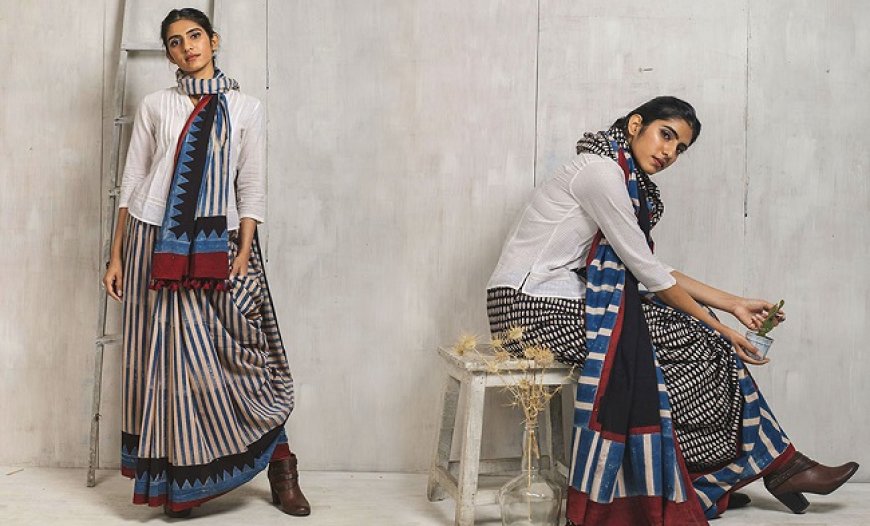The Rise of Sustainable Ethnic Fashion
Discover how sustainable ethnic fashion blends traditional craftsmanship with eco-friendly materials like cotton, muslin, and cotton lace.

In recent years, the fashion industry has witnessed a significant shift towards sustainability and eco-friendly practices. This trend has particularly taken root in the realm of ethnic fashion, where traditional craftsmanship meets modern sensibilities. As consumers become more conscious of their environmental impact, they are increasingly drawn to clothing that not only celebrates cultural heritage but also aligns with their values of sustainability.
One of the key players in this sustainable ethnic fashion movement is the humble cotton fabric. Known for its versatility, breathability, and comfort, cotton has long been a staple in Indian clothing. However, its popularity has surged as people recognize its eco-friendly qualities. Pure cotton fabrics are biodegradable, renewable, and require less water and fewer chemicals to produce compared to synthetic materials.
Cotton blend cloth has also gained traction in the sustainable fashion sphere. By combining cotton with other natural fibers, manufacturers can create fabrics that retain the benefits of cotton while introducing new properties such as enhanced durability or texture. These blends often result in fabrics that are not only environmentally friendly but also more functional for various clothing styles and climates.
Another fabric that has captured the attention of sustainable fashion enthusiasts is muslin. This lightweight, plain-weave cotton fabric has a rich history in Indian textiles and is experiencing a revival in modern ethnic wear. Muslin's popularity stems from its softness, breathability, and ability to drape beautifully, making it perfect for flowing garments like sarees, kurtis, and palazzo pants. Its natural, unbleached variants are particularly sought after by eco-conscious consumers looking for chemical-free clothing options.
In the world of embellishments, cotton lace has emerged as a favorite among designers and consumers alike. This delicate and intricate fabric adds a touch of elegance to ethnic wear without compromising on sustainability. Cotton lace is often handcrafted, supporting traditional artisans and preserving age-old techniques. Its versatility allows it to be incorporated into various garments, from wedding attire to everyday wear, adding a romantic and feminine touch to sustainable fashion choices.
The shift towards sustainable ethnic fashion is not just about the materials used; it's also about reviving traditional production methods. Many designers are now collaborating with local artisans to create clothing using time-honored techniques like hand-weaving, block printing, and natural dyeing. These methods not only produce unique, high-quality garments but also help preserve cultural heritage and support local communities.
Moreover, the concept of "slow fashion" has found a natural home in ethnic wear. Unlike fast fashion, which encourages frequent purchases and disposability, ethnic fashion often emphasizes timeless designs and durability. Consumers are increasingly investing in well-made, versatile pieces that can be worn for years, reducing overall consumption and waste.
The rise of sustainable ethnic fashion has also led to innovative approaches in garment care and lifecycle. Many brands now offer guidance on how to care for natural fabrics to extend their lifespan. Additionally, there's a growing trend of upcycling and repurposing ethnic wear, giving new life to old garments and reducing textile waste.
As we look to the future, the intersection of sustainability and ethnic fashion promises exciting developments. Designers are experimenting with new eco-friendly materials and production techniques while drawing inspiration from traditional aesthetics. This fusion of old and new is creating a vibrant, responsible fashion landscape that respects both cultural heritage and environmental concerns.
In conclusion, the trend towards sustainable ethnic fashion represents a significant shift in consumer values and industry practices. By embracing natural fabrics like cotton, muslin, and cotton lace, and reviving traditional craftsmanship, the fashion industry is not only reducing its environmental impact but also celebrating cultural diversity. As this trend continues to grow, we can look forward to a future where style, tradition, and sustainability coexist harmoniously in our wardrobes.
What's Your Reaction?
 Like
0
Like
0
 Dislike
0
Dislike
0
 Love
0
Love
0
 Funny
0
Funny
0
 Angry
0
Angry
0
 Sad
0
Sad
0
 Wow
0
Wow
0















































